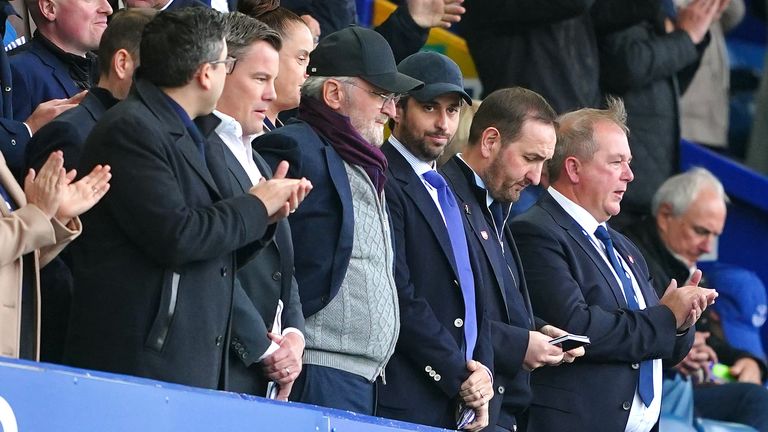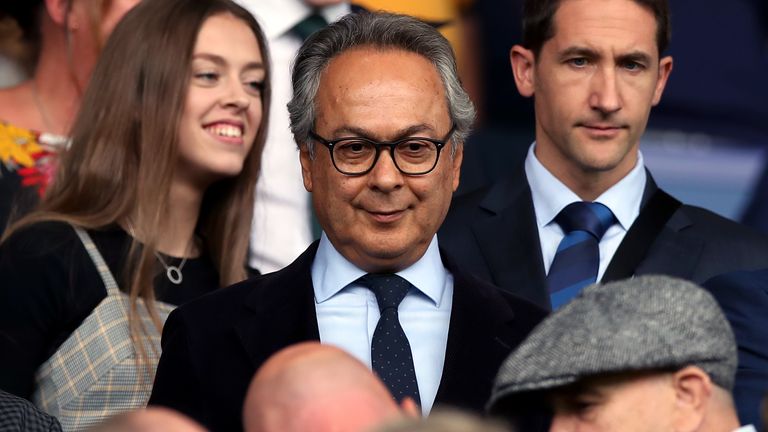You have to feel for Everton’s long-suffering supporters, writes Sky Sports News’ Alan Myers.
There they were, enjoying the summer break watching Jordan Pickford perform heroically in the Euros, the club seemingly keeping hold of prized asset Jarrad Branthwaite, the launch of a new kit ahead of a momentous final season at Goodison Park – and the hope of a new owner in the form of American Dan Friedkin on the horizon.
Then, almost out of the blue came the news that The Friedkin Group had decided to pull out of the proposed sale, due to concerns over the financial makeup of the deal.
It’s fair to say the sale of Everton is a complicated issue, and needs careful navigation. The Friedkin Group (TFG) had let it be known that a process of due diligence was taking place and there were a number of issues to be resolved before anyone could begin to celebrate a new dawn at the club.
It’s also correct to say that there was a real will and desire to get a deal done. There is a huge potential in owning Everton – no more so than the new stadium at Bramley Moore Dock, which is to open for the start of the 2025/26 season, with the venue already chosen as a host stadium for Euro 2028.
So, the sudden and unexpected news that the deal is off has hit hard with fans and all at the club alike. There was a feeling that light at the end of a long tunnel was beginning to shine.
TFG’s issue, as I understand it, is the uncertainty over 777 Partners’ ongoing issues. The group had spent eight months looking to own the club themselves and their outlay would need to be paid back by whoever wants to buy the club.
It seems the uncertainty around 777 made it impossible for TFG to take a view on how they could be stewards of Everton and take a calculated view on risk and return of an acquisition. There is a lot going on with 777 and its lenders A-Cap at the moment and that uncertainty appears to have caused TFG to step back and rethink.
777 and A-Cap understandably want their investment repaid – after all, they did put in the money when seemingly nobody else wanted to, a big risk for them, especially with the club facing two Profit and Sustainability Rule (PSR) charges at the time.
That money was vital for working capital and stadium financing, and undoubtedly helped the club through a difficult period. That loan has to be repaid immediately, should a buyer agree a deal. Farhad Moshiri has a further two years to pay it if he remains the majority shareholder.
TFG could have waited it out to see what happens with 777 and A-cap, but there was a feeling amongst the group that the club and its fans had already waited too long for a resolution on the ownership situation and that a quick decision would be in the best interests of everyone concerned.
The group also remain heavily invested in the club, as they paid off a loan from MSP Sports Capital – an American group who had funded stadium finance earlier in the process – along with local businessmen Andy Bell and George Downing. That came to around £158m, with TFG also adding to that with more stadium funding, which is believed to take the figure to nearer £200m.
Buying Everton represents a huge commitment for whoever ultimately takes over Moshiri’s majority shareholding. TFG also own Roma, which is also a major investment for them. Finding the funding for both would not be an easy thing to achieve, so they would naturally want the best and most attractive purchase they can get. Would they come back at a later date, should the situation change? I certainly wouldn’t rule it out – after all they did walk away from the deal with Roma at one point only to resurface a few months later.
So what’s next? Well, as far as the short-term financial situation is concerned there is no problem, the club is “well-funded” currently, one person with knowledge of the situation told me. This is not about the financial running of the club’s books, which has seen a real effort to get back on track following the PSR issues. I’m told the due diligence process went smoothly. The club will also continue to do its transfer business with no change in approach this summer, and I’m told the ownership issue will have no bearing on Everton keeping hold of their prized assets such as Jarrad Branthwaite in this window.
However, that is the short-term view. Moshiri and the club must now look to secure a long-term funding solution. The stadium is safe, built and almost completely paid for – that will be a determining factor when the previous bidders such as John Textor, The Manoukian group and others may or may not resurface.
In the meantime, Everton fans will once again be watching daily, hourly, for the next instalment of this intriguing story to play out.
When does the summer transfer window close?
The 2024 summer transfer window officially closes on August 30 at 11pm UK time in the Premier League and 11.30pm in Scotland.
The Premier League has brought forward Deadline Day to link up with the other major leagues in Europe. The closing dates were set following discussions with the leagues in England, Germany, Italy, Spain and France.



















